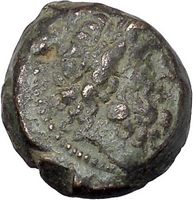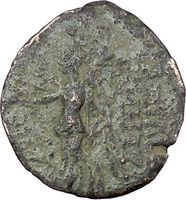|
Greek Coin of
Seleucid Kingdom
Demetrios II, Nikator
- King: 146-138 B.C.
Bronze 20mm (6.33 grams) Antioch on the Orontes mint
Reference: HGC 9, 1133 (R1-2); SC 2170
Diademed head of Zeus right.
ΒΑΣΙΛΕΩΣ
ΔΗΜΗTPIOY ΘΕΟΥ NIKATOPOΣ, Nike advancing left, holding
wreath and palm branch.
You are bidding on the exact item pictured,
provided with a Certificate of Authenticity and Lifetime Guarantee of
Authenticity.
In the
ancient Greek
religion, Zeus was the
"Father of Gods and men" (πατὴρ ἀνδρῶν τε θεῶν
τε)
who ruled the Olympians of
Mount Olympus
as a father ruled the family. He was the
god of sky
and
thunder
in
Greek mythology
.
His
Roman
counterpart is
Jupiter
and
Etruscan
counterpart is Tinia
.![The Jupiter de Smyrne, discovered in Smyrna in 1680[1]](https://upload.wikimedia.org/wikipedia/commons/thumb/c/c8/Jupiter_Smyrna_Louvre_Ma13.jpg/200px-Jupiter_Smyrna_Louvre_Ma13.jpg)
Zeus was the child of
Cronus
and
Rhea
,
and the youngest of his siblings. In most traditions he was married to
Hera, although, at the
oracle of Dodona
,
his consort was
Dione
:
according to the Iliad
,
he is the father of
Aphrodite
by Dione. He is known for his erotic escapades. These resulted in many godly and
heroic offspring, including
Athena
,
Apollo
and Artemis
,
Hermes
,
Persephone
(by Demeter
),
Dionysus
,
Perseus
,
Heracles
,
Helen of Troy
,
Minos
,
and the Muses
(by Mnemosyne
);
by Hera, he is usually said to have fathered
Ares,
Hebe
and Hephaestus
.
As
Walter Burkert
points out in his book, Greek Religion, "Even the gods who are not his
natural children address him as Father, and all the gods rise in his presence."
For the Greeks, he was the
King of the Gods
,
who oversaw the universe. As
Pausanias
observed, "That Zeus is king in heaven is a saying common to all men". In
Hesiod's Theogony
Zeus assigns the various gods their roles. In the Homeric Hymns he is
referred to as the chieftain of the gods.
His symbols are the
thunderbolt
,
eagle
,
bull
,
and oak
.
In addition to his Indo-European inheritance, the classical "cloud-gatherer"
also derives certain iconographic traits from the cultures of the
Ancient Near East
,
such as the
scepter
.
Zeus is frequently depicted by Greek artists in one of two poses: standing,
striding forward, with a thunderbolt leveled in his raised right hand, or seated
in majesty.
 In
Greek mythology
,
Nike
was a
goddess
who personified
victory
, also known as the Winged Goddess of
Victory. The Roman equivalent was
Victoria
. Depending upon the time of various
myths, she was described as the daughter of
Pallas
(Titan) and
Styx (Water) and the sister of
Kratos
(Strength),
Bia
(Force), and
Zelus
(Zeal). Nike and her siblings were close
companions of Zeus
, the dominant deity of the
Greek pantheon
. According to classical (later)
myth, Styx brought them to Zeus when the god was assembling allies for the
Titan War
against the older deities. Nike
assumed the role of the divine
charioteer
, a role in which she often is
portrayed in Classical Greek art. Nike flew around battlefields rewarding the
victors with glory and fame.
In
Greek mythology
,
Nike
was a
goddess
who personified
victory
, also known as the Winged Goddess of
Victory. The Roman equivalent was
Victoria
. Depending upon the time of various
myths, she was described as the daughter of
Pallas
(Titan) and
Styx (Water) and the sister of
Kratos
(Strength),
Bia
(Force), and
Zelus
(Zeal). Nike and her siblings were close
companions of Zeus
, the dominant deity of the
Greek pantheon
. According to classical (later)
myth, Styx brought them to Zeus when the god was assembling allies for the
Titan War
against the older deities. Nike
assumed the role of the divine
charioteer
, a role in which she often is
portrayed in Classical Greek art. Nike flew around battlefields rewarding the
victors with glory and fame.
Nike is seen with wings in most statues and paintings. Most other winged
deities in the Greek pantheon had shed their wings by Classical times. Nike is
the goddess of strength, speed, and victory. Nike was a very close acquaintance
of Athena
, and is thought to have stood in
Athena's outstretched hand in the statue of Athena located in the Parthenon.
Nike is one of the most commonly portrayed figures on Greek coins.
Names stemming from Nike include amongst others:
Nicholas
, Nicola, Nick, Nikolai, Nils, Klaas,
Nicole, Ike, Niki, Nikita, Nika, Niketas, and Nico.
Demetrius II (Ancient Greek:
Δημήτριος Β`, Dēmḗtrios B; died
125 BC), called Nicator (Ancient Greek:
Νικάτωρ, Nikátōr, "the Victor"),
was one of the sons of
Demetrius I Soter
, brother of
Antiochus VII Sidetes
and his mother could have been
Laodice V
.
He ruled the Seleucid Empire for two periods, separated by a number of years of
captivity in Hyrcania
in
Parthia
.
In exile
As a young boy, he fled to
Crete
after the
death of his father, his mother and his older brother, when
Alexander Balas
usurped the
Seleucid
throne.
First reign
About 147 BC he returned to the Seleukid Kingdom, and with the backing of
Ptolemy VI Philometor
, king of Egypt, regained his father's throne. The
Egyptian king also divorced his daughter
Cleopatra Thea
from Balas and remarried her to Demetrius.
Alexander fled to the Nabateans who, anxious to stay on good terms with Egypt,
cut off his head.
However, Demetrius was not a popular king. The people of the Seleukid Kingdom had little
respect for the young boy, who had come to power with the help of Egypt and
Cretan mercenaries led by the ruthless condottiere Lasthenes. The Antiochenians
offered the Seleucid throne to Ptolemy VI, who had already conquered most of
southern the Seleukid Kingdom for his own interest. However, he insisted Demetrius would become
king, knowing that Rome would never tolerate a unified Hellenistic state, and
the year after Ptolemy VI was killed when Alexander Balas made a last desperate
attempt to regain his throne. The Egyptian troops marched home, leaderless and
disillusioned, and with Balas dead as well Demetrius became sole master of the
Seleucid kingdom.
But new troubles soon arose. The pillaging of the Cretan soldiers caused the
Antiochenians to rise in rebellion, and only after terrible massacres was order
restored. Soon after, the general
Diodotus
conquered Antioch and had his protégé
Antiochus VI Dionysus
, the infant son of Alexander Balas, proclaimed king.
Demetrius proved unable to retake the capital, instead establishing himself in
Seleucia. Diodotus had Antiochus VI deposed a few years later, and made himself
king as Tryphon, but the division of the kingdom between the legitimate Seleucid
heir and the usurper in Antioch persisted.
Defeat and captivity
In 139 BC Parthian activity forced Demetrius to take action. He marched
against
Mithradates I
, king of
Parthia
and was initially successful, but was defeated in the
Parthian
mountains and taken prisoner the following year. The Babylonian province of the
Seleucid empire became Parthian, but in the Seleukid Kingdom was the dynasty's grip was
reassured under
Antiochus VII Sidetes
, the younger brother of Demetrius, who also married
Cleopatra Thea.
King Mithradates had kept Demetrius II alive and even married him to a
Parthian princess named
Rhodogune
, with whom he had children. However, Demetrius was restless and
twice tried to escape from his exile in
Hyrcania
on
the shores of the Caspian sea, once with the help of his friend Kallimander, who
had gone to great lengths to rescue the king: he had travelled incognito through
Babylonia and Parthia. When the two friends were captured, the Parthian king did
not punish Kallimander but rewarded him for his fidelity to Demetrius. The
second time Demetrius was captured when he tried to escape, Mithradates
humiliated him by giving him a golden set of dice, thus hinting that Demetrius
II was a restless child who needed toys. It was however for political reasons
that the Parthians treated Demetrius II kindly.
In 130 BC Antiochus Sidetes felt secure enough to march against Parthia, and
scored massive initial successes. Now
Phraates II
made what he thought was a powerful move: he released Demetrius,
hoping that the two brothers would start a civil war. However, Sidetes was
defeated soon after his brother's release and never met him. Phraates II set
people to pursue Demetrius, but he managed to safely return home to the Seleukid
Kingdom and
regained his throne and his queen as well.
A failed second reign
However, the Seleucid kingdom was now but a shadow of its former glory, and
Demetrius had a hard time ruling even in the Seleukid Kingdom. Recollections of his cruelties
and vices – along with his humiliating defeat – caused him to be greatly
detested. The Egyptian queen
Cleopatra II
set up an army for Demetrius, hoping to engage him in her civil
wars against her brother king
Ptolemy VIII
, but this only added to his grief. The troops soon deserted,
and king Ptolemy VIII reacted by setting up yet another usurper, a man named
Alexander II Zabinas
against Demetrius.
In 126 BC Demetrius was defeated in a battle at
Damascus
.
He fled to Ptolemais but his wife
Cleopatra Thea
closed the gates against him.
He was killed on a ship near
Tyre
, after his wife had deserted him. His miserable death after being
captured and possibly tortured, was a fitting epitaph to the many shortcomings
of his reign. Demetrius II was certainly incapable of handling the developing
threats to the Seleucid empire, but his reputation for cruelty was probably
undeserved. He was only around fourteen at his coronation, and the real power
was in the hands of others. He was succeeded by his queen Cleopatra Thea and
then by two of their sons,
Seleucus V Philometor
and
Antiochus VIII Grypus
.
|
Demetrius II Nicator
Seleucid dynasty
Born:
Unknown
Died:
125 BC |
Preceded by
Alexander Balas
|
Seleucid King
146–139 BC
with
Antiochus VI Dionysus
(145–142 BC)
Diodotus Tryphon
(142–139 BC) |
Succeeded by
Antiochus VII Sidetes
|
Preceded by
Antiochus VII Sidetes |
Seleucid King
129–126 BC
with
Alexander II Zabinas
(129–123 BC) |
Succeeded by
Cleopatra Thea
|
Seleucid
Empire
Σελεύκεια
Seleúkeia |

|
312 BC–63 BC |
↓
|
|
|
The Seleucid Empire in 301 BC.
|
The Seleucid Empire
was a
Hellenistic
state ruled by the Seleucid dynasty
founded by
Seleucus I Nicator
following the division of
the empire created by
Alexander the Great
. Seleucus received
Babylonia
and, from there, expanded his
dominions to include much of Alexander's
near eastern
territories. At the height of its
power, it included central
Anatolia
, the
Levant
,
Mesopotamia
,
Kuwait
,
Persia
,
Afghanistan
,
Turkmenistan
, and northwest parts of
India
.
The Seleucid Empire was a major center of
Hellenistic
culture that maintained the
preeminence of
Greek
customs where a Greek-Macedonian
political elite dominated, mostly in the urban areas. The Greek population of
the cities who formed the dominant elite were reinforced by emigration from
Greece
. Seleucid expansion into
Anatolia
and Greece was abruptly halted after
decisive defeats
at the hands of the
Roman army
. Their attempts to defeat their old
enemy
Ptolemaic Egypt
were frustrated by Roman
demands. Much of the eastern part of the empire was conquered by the
Parthians
under
Mithridates I of Parthia
in the mid-2nd century
BC, yet the Seleucid kings continued to rule a
rump state
from
the Seleukid Kingdom
until the invasion by
Armenian
king
Tigranes the Great
and their ultimate overthrow
by the Roman
general
Pompey
.
|


![The Jupiter de Smyrne, discovered in Smyrna in 1680[1]](https://upload.wikimedia.org/wikipedia/commons/thumb/c/c8/Jupiter_Smyrna_Louvre_Ma13.jpg/200px-Jupiter_Smyrna_Louvre_Ma13.jpg)
 In
Greek mythology
,
In
Greek mythology
,
